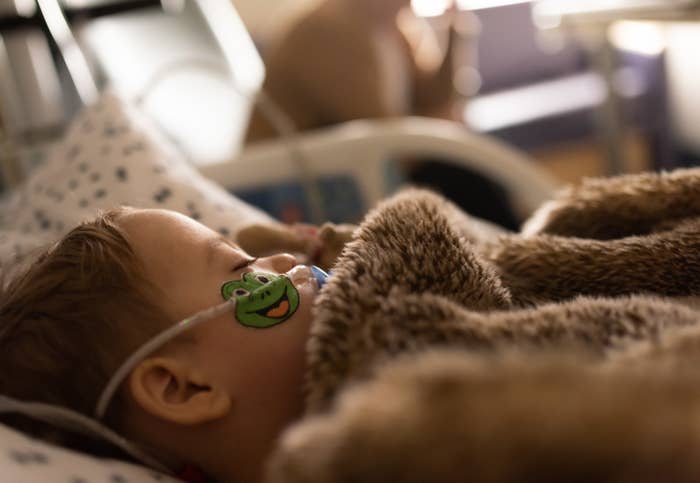
Doctors have reported a recent spike in the common respiratory illness known as RSV in children, raising alarm among infectious disease experts who say they're seeing more young patients in the hospital much earlier in the season than expected.
Seattle Children's Hospital reported that 30% of respiratory viral tests in its emergency department last week were positive for RSV. Now, staff are seeing 20 to 30 positive cases each day, said Russell Migita, an attending physician and clinical director of emergency services at the hospital.
Children's National Hospital in Washington, DC, and Johns Hopkins Children’s Center in Baltimore were also operating at or near capacity last week, DCist reported. Hospital and ICU beds at Comer Children's Hospital in Chicago have been full for weeks, many of them occupied by RSV patients, NBC News reported.
Although it's a common virus, experts said RSV can be dangerous for young children. Here's what you need to know about this virus surge and why doctors are concerned.
What is RSV?
RSV is a common respiratory virus that doctors see every year. According to the CDC, practically all children have had an RSV infection by age 2, and it is the most common cause of bronchiolitis and pneumonia in children under a year old in the US.
Typically, RSV shows up as a "fairly mild respiratory illness" in most children, said Lauren Gambill, a pediatric hospitalist at Dell Children’s Medical Center and assistant professor of pediatrics at Dell Medical School at the University of Texas at Austin.
RSV can infect people at any age. Older children who have already built some level of immunity usually don't get nearly as sick as infants, but it can be dangerous for toddlers and premature babies.
Children under 2 are more at risk of getting severe illness and developing bronchiolitis, an infection that narrows the airways in the lungs, making breathing difficult, Gambill told BuzzFeed News.
Adrienne Randolph, a senior associate in critical care at the Boston Children's Hospital department of anesthesiology and professor of anesthesia and pediatrics at Harvard Medical School, said older children are also being infected in large numbers in this current wave.
"Now you see children who are older showing up with RSV and getting very sick, as well as the babies," she said. "The numbers are just very high."
If this is so common, why is it concerning?
The virus itself is not really cause for alarm. RSV season typically runs from December to April, and medical staff plan for peaks in February and March, Migita said.
But this is an early season, and he predicted that it will likely be a severe one.
"In typical years, children get many viral infections spread out over their first two years of life. Because of the success of masking and social distancing, those viral infections are all being clustered at the same time," he said. "Having more than one infection at the same time can cause more severe illness. The fact that so many children are getting their first RSV infection now is driving the volumes."
At Seattle Children's Hospital, Migita said they are seeing twice the number of patients they normally would in October. The hospital's emergency department is currently at about 200% of capacity, with half its patients displaying symptoms of a respiratory virus.
"It is likely to get worse when influenza peaks," he said.
Doctors at other hospitals said they are seeing a similar pattern. Gambill, who treats hospitalized patients, estimated that one-third of her patients are coming in now with RSV infections.
"This year, [the RSV season] seems to have shifted a little bit earlier than we typically see it," Gambill said. "We're also seeing influenza a little bit earlier than we normally see it, on top of kind of overall staffing shortages that are happening nationally in healthcare, particularly in pediatrics. And I think it's sort of this perfect storm of a lot of different variables that have led to very full hospitals."
The current RSV surge also further strains a healthcare system already stretched thin by shortages in staffing and beds.
"I think the part that's hardest for us right now is the landscape, as far as staffing and healthcare shortages as a whole, not the actual RSV," Gambill said. "It's not a new or different illness in that way. It's just sort of, our surge is coming earlier at a time when we have less resources nationally."
Why is the surge happening earlier than usual?
Many healthcare experts believe that preventive measures for COVID have kept other viruses at bay. But with public life largely back in the pre-pandemic swing of things, all sorts of viruses are making a comeback and viral patterns are changing.
"We have seen a bit of a shift in a lot of the patterns of some of the viral illnesses that we take care of, after COVID. Last year, our patterns were dramatically different than they normally are as well," Gambill said.
Children mostly avoided common viral illnesses over the past two years or so, she said, but those viruses are in circulation again.
"We're seeing kids that maybe don't have the same level of immunity that they otherwise would have, and so they're potentially getting sicker than they would've, had they had all of the kind of coughs and colds we typically saw before COVID," she said.
Randolph said more older children are being infected with RSV now, too, because they likely hadn't been exposed to the virus.
"As we get exposed to viruses seasonally, you continue to refresh your immunity to those viruses," Randolph said. "But when you don't refresh your immunity, either by being exposed or through vaccination, that puts more people and children at risk of getting more so severely ill, because they don't have the immunity to protect them."
How can kids avoid being infected?
Some of the practices we learned during the pandemic apply here too: Wash your hands and keep a safe distance. (Doctors recommend that children under 2 don't wear a mask, even though that's the age group at higher risk of getting sick with RSV, Gambill said.)
If your child is feeling sick, keep them away from school or daycare so they don't spread it to others.
But RSV can be hard to prevent entirely when the virus is circulating at such high levels, Randolph said. The best thing to do is make sure your child sees a pediatrician as soon as they show trouble breathing or eating, especially if they're a baby and are more vulnerable.
Thankfully, according to Randolph, the mortality rate among children for RSV is very low.
"Most of these babies will pull through fine with supportive care," she said. "Identifying when they get into trouble early and taking them in for care, their outcomes are generally very good."
